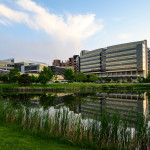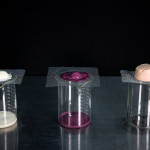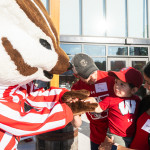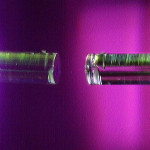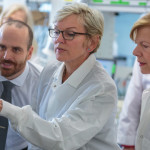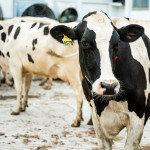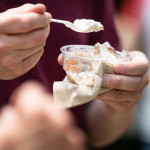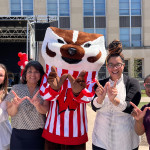Campus news Latest News
Wind from black holes may influence development of surrounding galaxies
The discovery helps illuminate the way active black holes can continuously shape their galaxies by spurring on or snuffing out the development of new stars.
Search begins for next dean of the School of Medicine and Public Health
A search committee has been appointed to help identify and select candidates to be the next dean of the University of Wisconsin School of Medicine and Public Health and vice chancellor for medical affairs.
Mallory Musolf named next secretary of the academic staff
Mallory Musolf, a former member of the Academic Staff Executive Committee who has served in administrative roles on campus for more than a decade, has been named secretary of the academic staff.
Bringing delight by investigating a no-melt ice cream
Cameron Wicks, a PhD student in the University of Wisconsin–Madison’s Department of Food Science, is working on a new technology that adds naturally occurring compounds to ice cream to prevent it from wreaking summertime havoc.
Small, cool and sulfurous exoplanet may help write recipe for planetary formation
UW–Madison astronomers and their collaborators hope the discovery of one exoplanet's sulfurous atmosphere will advance our understanding of how planets forms.
UW offers support following downtown shooting
The University of Wisconsin–Madison is offering sympathy and concern for those injured, along for resources and support to UW students who may have been impacted by a Sunday, June 9 shooting downtown. None of those injured are UW–Madison students and there is no known university affiliation to the incident at this time, according to police.
UW–Madison names Haddix new School of Education dean
Haddix has held numerous leadership positions in her 16 years at Syracuse University and currently serves as associate provost for strategic initiatives. She also led for two terms as chair of the Reading and Language Arts department in the School of Education at Syracuse. Haddix describes her work as “very interdisciplinary” and believes the School of Education’s focus on education, arts and health is aligned with her vision of what a holistic approach to education should be.
National scholarship will allow UW student to continue inventive historical research
Axell Boomer, a senior from South Beloit, Illinois, is one of 19 college undergraduates nationwide to receive a Beinecke Scholarship this year. He is majoring in history and religious studies with honors in the liberal arts and honors in history. He anticipates graduating in the spring of 2025 and intends to pursue a doctorate in history.
NIH director’s visit to UW–Madison highlights biomedical research, future opportunities
The daylong visit highlighted the university’s innovative work in areas such as theranostics and precision medicine, and Director Monica Bertagnolli heard how UW–Madison researchers are combining data-driven diagnostics and innovative technologies to develop highly targeted cancer treatments.
UW–Madison scientists develop most sensitive way to observe single molecules
The new method could have implications for pursuits as varied as drug discovery and the development of advanced materials.
Abandoned farmlands could play a role in fighting climate change. A new study shows exactly where they are.
A research team used machine learning to map nearly 30 million acres of United States cropland abandoned since the 1980s, creating a tool that could guide decisions about how to balance production of energy and food.
Employee Appreciation Ice Cream Socials
This annual event serves as a gesture of thanks for employees’ hard work and dedication throughout the academic year by serving our world-famous Babcock ice cream.
UW–Madison engineers mark 3D printing milestone in race to in-space manufacturing
Researchers at the University of Wisconsin–Madison have taken a step toward in-space manufacturing of replacement electronic components by successfully 3D printing RAM device units in zero gravity for the first time.
A new history brings to life people, places and innovations of Wisconsin astronomy
A new book, Chasing the Stars: How the Astronomers of Observatory Hill Transformed Our Understanding of the Universe traces the history of astronomy in Wisconsin and at UW–Madison, beginning with the Indigenous mound builders through the construction of Washburn Observatory to the present day, bringing to life the people, places and innovations that have made Wisconsin an important contributor to our understanding of the universe.
A hub for community connection in South Madison
“UWSMP is more than just a building—it's a space that breaks down barriers and sparks collaboration,” notes Brenda González, director of community relations at UW–Madison. “We are a resource for South Madison and our partners, and our team is delighted to welcome community members into the space every day.”
Forbes names UW–Madison as ‘new Ivy’
Hiring managers are increasingly turning to these 20 public and private institutions for graduates who are better prepared to enter the workforce, as they’ve done much to improve their students’ readiness over the past five years, Forbes said.


